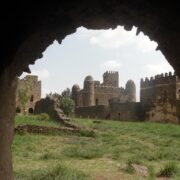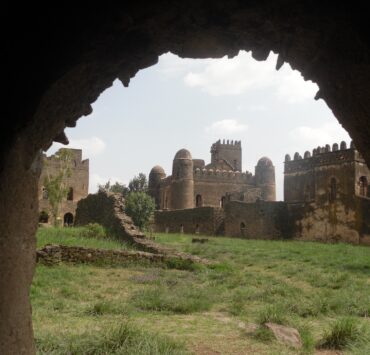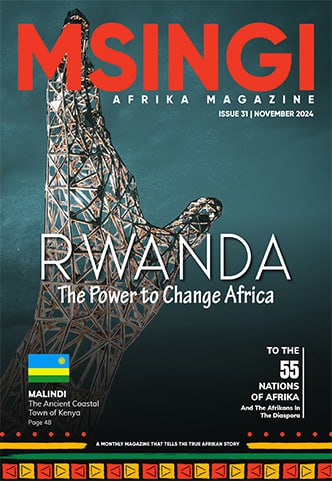
Baruti Katembo is a member of the Mathematics Faculty -…
Upenyu Majee is Program Manager - Ubuntu Dialogues Project at…
*Originally published by the authors as ‘Ubuntu in a Few Pages’
INTRODUCTION
Many people, especially in the West, may know more about Ubuntu from basketball teams printing it on their warm-up shirts; from organizations, places and software systems named after it; and from businesses deploying it to boost productivity and harmony in workplaces. But what is it exactly and why the importance of better understanding it – and for whom? It is many things, including a label, a brand, a logo, a business tool, a spiritual belief system, and a medium for intercultural dialogue. Notably, Ubuntu is often thought of as an abstract idea that has limited application to 21st century socio-economic and political realities, demands and constraints – all defined and dominated as they are by capitalism, scientific empiricism, and individualism.
In this synopsis of the concept and practice of Ubuntu, the co-authors attempt to go beyond the labels, brands, logos, and abstractions. This effort emerged out of the need to articulate and present Ubuntu from an Afrocentric perspective, especially as the concept relates to Pan-Africanism[1] and ongoing struggles and efforts to decolonize[2] knowledge and institutions. The multi-layered perspective presented here is constructed on four key tenet categories: Definition, Ownership, Branding Use,and Practical Application.
Definition: Theoretical and Practical Meanings
Ubuntu (oo-boon-too), an Nguni term meaning “humanity” – literally, ubu (becoming) + ntu (person), has roots in an African, community-centered, humanist philosophy which the Zulu proverb Umuntu ngumuntu ngabantu (a person is a person through other persons) captures so well. This proverb is a standard phrase that many people, familiar with the term, use to characterize Ubuntu as an African socio-centric philosophy premised on interdependence and collective humanity. Building on this idea, the co-authors emphasize three different, yet connected, slants on understanding Ubuntu conceptually and practically: 1. a social construct whereby people are extensions and composites of the communities from which they are spawned, i.e., a moral ethic that shapes their internal views and values; 2. an ideology to facilitate people-to-people interface, within and outside their immediate identity groups, and from a human kindness vantage point; 3. a philosophy for expressing and increasing the appreciation of common identity and heritage among people of African descent, and for a re-centering of themselves within their own cosmos.
Ubuntu as a concept gained prominence thanks to the global profile of Nelson Mandela and Bishop Desmond Tutu who both advocated for its use in facilitating peaceful racial relations and reconciliation during the transition from apartheid to multi-racial democracy in South Africa. While African in foundation, this social construct, ideology and philosophy has utility and lessons for all; it embodies ethical values that are applicable and relevant the world over, such as reciprocity, integrity, empathy and honesty, just to name a few.
Ownership: Concept Owners
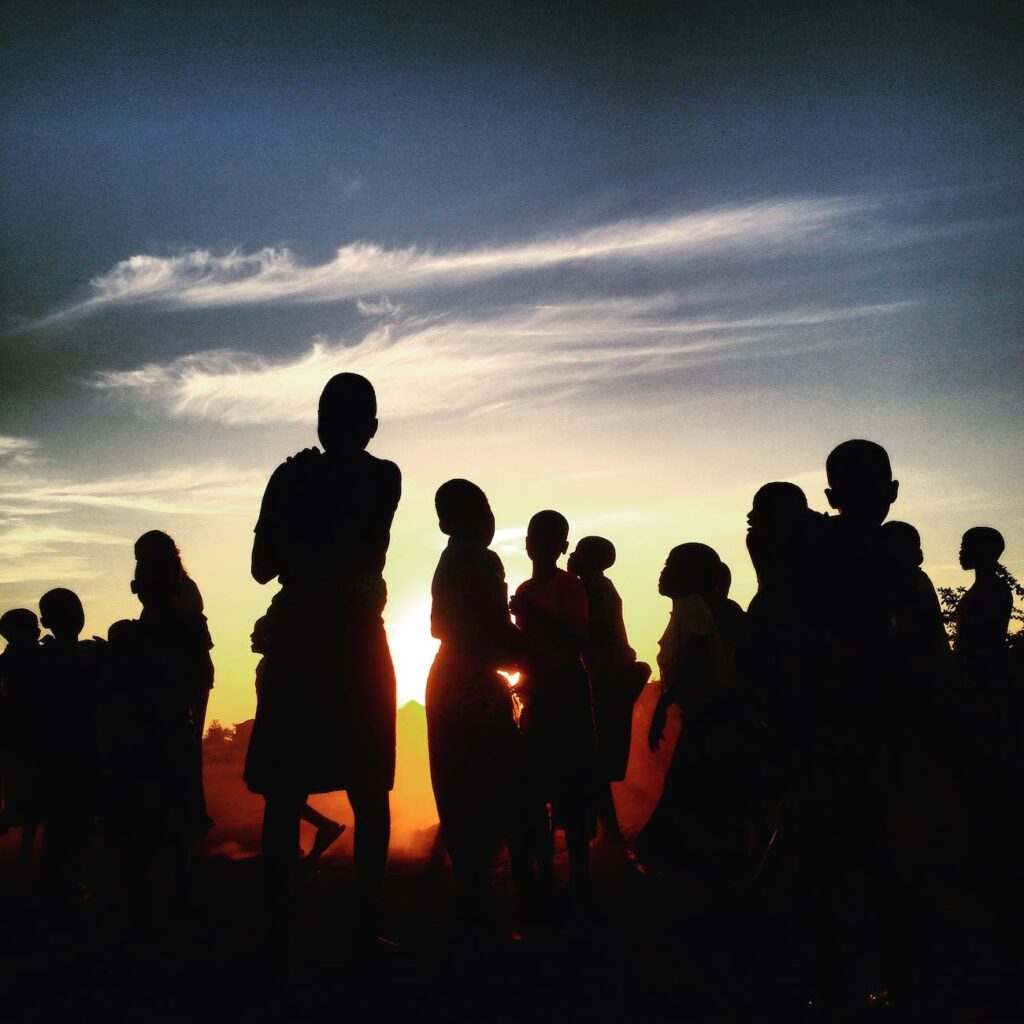
Ubuntu is an extension of the Bantu (Black or indigenous African) people: the word Bantu means “people”. Insofar as “Bantu” has recognizable equivalents in most languages indigenous to Africa, the “people” are not walled into exclusive linguistic zones, but are expansively Pan-African, inclusive of and embracing indigenous Africa and its Diaspora. The spread and eventual morph of proto-Bantu into many hundreds of cross-Continent Bantu languages (e.g., KiKongo, IsiZulu and KiSwahili) and cultures have been attributed to the Bantu Migration, an enormous trek from the north-west region to other tropical zones in central, eastern and southern Africa[3]. The knowledge the proto-Bantu speakers carried with them (e.g., pottery-making, creating iron tools and crop/livestock domestication)[4] has important implications not only for a historical analysis of ancient farming and metallurgy, but also for thinking about the value and place of African knowledge systems today. In other words, despite the Continent’s mammoth ethno-cultural diversity, the imprint of Bantu culture and civilization captures a collective African essence of being. Ultimately, Ubuntu is an in-house asset, cultural resource, and philosophical narrative at the disposal of indigenous and Diaspora people of Africa. If optimally tapped, it cultivates intra-African connectedness and empowerment, thus positioning Global Africa (Continent + associated Diaspora) ontologically and epistemologically to engage with the rest of the world.
Branding Use: Instrument of Value and Marketing Foci
The awareness of Ubuntu around the world appears as both a visual label and public concept, indicative of its varied branding uses. Below are selected examples:
- Moniker for labeling public spaces and organizations, e.g., Ubuntu Village, a holistic and healing center in Kansas City, MO; Ubuntu Pathways, a non-profit organization that provides an integrated support system of health, education and social support in the townships of Gqeberha, South Africa.
- Philosophical backdrop and catalyst for social cohesion, e.g., Archbishop Desmond Tutu’s famous Ubuntu description set the mood, tone and climate for how the dialogue in the Truth and Reconciliation Commission would be conducted and for facilitating the efforts to promote post-Apartheid social harmony in South Africa.
- Technology application, e.g., Ubuntu, an open-source operating system; Haines, N. (2017). Beginning Ubuntu for Windows and Mac Users (2nd edition).
- Business philosophy deployed as a tool for creating a productive work environment via management-worker synergy, e.g., Malunga, C. (2009). Understanding Organizational Leadership Through Ubuntu.
- Narrative to promote intellectual, cross-cultural, and transnational engagement, e.g., the Ubuntu Dialogues project, a partnership between the African Studies Center at Michigan State University and the Stellenbosch University Museum at Stellenbosch University, funded by the Andrew W. Mellon Foundation.
- Interconnection symbol used in books and writings to epitomize social harmony, e.g., Richards, S. (2018). Go Together: How the Concept of Ubuntu Will Change How You Live, Work, and Lead.
- Conceptual lens for research and for donor-funded educational and entertainment projects, e.g., Ubuntu Leaders Academy, a non-formal educational and leadership training project sponsored by the European Commission; Hoops Africa: Ubuntu Matters, a movie on basketball in Africa.
Practical Application: Support Pillars for Civilization-Building
Collectively, the Black or indigenous African people have not really drawn on Ubuntu as a resource except in naming, labeling and sometimes facilitating efforts of cooperation. With regards to the cooperation aspect, Doc Rivers, former coach of the Boston Celtics, openly-instituted Ubuntu concepts (such as ballplay unselfishness, teamwork and on-court, coordinated position shifts) to improve team chemistry, leading to a 2008 NBA Championship season.
There is a need to recognize that Ubuntu is a philosophical construct that offers a pathway to actualizing our common human needs, i.e., happiness, pleasant environment, peace, comfort, stability and interpersonal engagement inter alia. Unfortunately, the tendency to place kindness and forgiveness, not accountability, at the center of Ubuntu conversations has led to a misguided global attitude that mistakes kindness for weakness or spinelessness: Go to Africa and experience a warm welcome; then take what you want without the thought of consequence, theft or penalty. Although Ubuntu centers the richness and beauty of interdependence and collective humanity, it is far deeper and more complex than the superficialities of friendliness and congeniality.
Furthermore, at the practical level, Ubuntu underpins and actualizes what many sociologists (e.g., Dr. Maulana Karenga, author of Kawaida: An Introductory Outline) identify as the seven areas of culture: politics, economics, ethos, creative arts, history, social organization and mythology (inclusive of sacred writings, religion and fables). These seven areas of culture are the pillars of creating and maintaining a civilization, not just for the African people, but for any other people, ethnic group or race.
What then, one may ask, are some tangible ways in which Ubuntu applies to the actualization of the seven areas of culture?
- In politics, Ubuntu would encourage a participatory societal governance structure and approach, inclusive of democracy, fair-and-freewill voting and ongoing constructive dialogue between citizens and civic officials.
- In economics, Ubuntu would encourage non-exploitative free enterprise while providing social safety nets (e.g., worker compensation; unemployment benefits).
- In ethos, Ubuntu would encourage moral values and ethics (e.g., honesty; high character) as basic premises for individual and collective engagement with others.
- In creative arts (e.g., indigenous sculptures and textiles; technology), Ubuntu would enable people to celebrate their own beauty and cultural heritage, and facilitate community social health.
- In history, Ubuntu would ground people in a comprehensive knowledge of themselves as they critically examine their decisions and actions over time, make social correctives where needed, come to terms with their realities (past, present and potential futures) and assess interactions with (and responses to) the broader world.
- In social organization, Ubuntu would enhance the happiness index level of the community, increase the energy/enthusiasm to cultivate social institutions (e.g., family; marriage; education) and facilitate a deeper understanding of why flexibility and adaptation to changes is needed/important (e.g., infrastructure upgrades; technological innovation).
- In mythology, Ubuntu would promote the high value of the inner self and essence of the community through sacred writings, religion and literature.
Thus, the philosophical and ideological pillars of Ubuntu provide the blueprint and framework for actualizing the seven areas of culture.
CONCLUSION
In this document, the co-authors challenge readers to further investigate and explore the practical applications of Ubuntu. They present Ubuntu as an indigenous African ethic that facilitates Pan-Africanism and decolonization through engagement and networking among people of African descent and with the broader world. Just as a battery powers a flashlight to illuminate a dark space, Ubuntu frames and channels cultural ideas and practices to build and maintain an Afrocentric sense of being and worldview. As an expression of the African essence of being, Ubuntu functions as an ethno-spiritual system, drawing on and paralleling many moral and ethical principles which are associated with various religions and their respective texts, e.g., Christianity and the Bible. Black or indigenous African people can utilize Ubuntu in similar fashion to how meditation and martial arts such as Kung Fu and Judo express Asian cultural thinking – ideas about ways of being and of living.
The co-authors who began this endeavor don’t see this document as complete or final, but as evolving and open for review, expansion and further engagement. Therefore, they invite readers to join the ongoing and participatory process of co-constructing knowledge on Ubuntu – anything less would not do justice to the spirit of Ubuntu.
[1] The global linkage of Black people/indigenous Africans.
[2] Re-shifting from colonial logics to indigenous thoughts/practices.
[3] David Phillipson, “The Spread of the Bantu Language,” Scientific American, Vol. 236, No. 4 (April 1977), pp. 106-115; Rebecca Grollemund et al, “Bantu expansion shows that habitat alters the route and pace of human dispersals,” PNAS, October 27, 2015.
[4] See for example, Neus Isem and Joaquim Fort, “Assessing the importance of cultural diffusion in the Bantu spread into southeastern Africa,” PLOS ONE, May 8, 2019; PBS.org Staff Writer, “Guns, Germs and Steel – Episode Three: Into the Tropics,” PBS.org, January 1, 2005; and Flint Johnson, “The Bantu People: Migration, Language and Impact,” Study.com, February 3, 2016, https://study.com/academy/lesson/the-bantu-people-migration-language-and-impact.html
Subscribe now for updates from Msingi Afrika Magazine!
Receive notifications about new issues, products and offers.
What's Your Reaction?
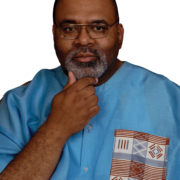 PIN IT
PIN ITBaruti Katembo is a member of the Mathematics Faculty - Florida State College at Jacksonville (United States), Alumnus of North Carolina A&T State University (BSIE; MS-Applied Mathematics) and North Carolina State University (MLArch), Co-author of several books and articles, inclusive of: UWENZI: The Pan-African Factor, A 21st Century View; "Thatched Dwellings, Pan-African Relations and Circularity" and has (Selected) research interests: numeracy, resource usage and sociotechnology. You can reach him at ufundi320@yahoo.com.
 PIN IT
PIN ITUpenyu Majee is Program Manager - Ubuntu Dialogues Project at Michigan State University, Faculty Lead - Reeves Scholars Program at Michigan State University, Co-convener of Decoloniality Dialogues and Joint PhD holder in Educational Policy Studies and Development Studies from the University of Wisconsin-Madison. You can reach him at majeeupe@msu.edu








